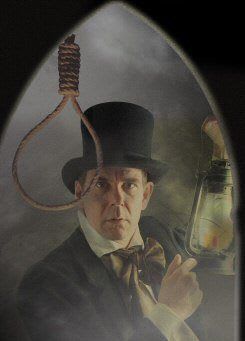If there is such a thing as a Scrooge about Halloween instead of about Christmas then I am it! Overpriced costumes, doortodoor scrounging, sanctioned sweetie gorging and spooky kiddies' discos: I can't stand any of it. Bah, Humbug! as it were.
Thank goodness that the Brockley Jack uncharacteristically opened its doors on a Monday night to offer some escape: The Dark Entry may have been billed as "A Halloween Special" but the play's ghostly premise was the only concession to All Hallow's Eve and not a pumpkin was to be seen.
This play was initially presented as a promenade performance at King's School, Canterbury, a stately place steeped in history, in the grounds of which there is to be found a shadowy passageway from which the play takes its title The Dark Entry. According to The Ingoldsby Legends, a compilation of local mysteries, ghost stories and folklore written in verse by 19th cleric R H Barham, this walkway is haunted by the ghost of a young lady, Nell.
In the play, Victorian Ingoldsby is about to use his magic lantern to illustrate his account of a saga of jealousy, woman scorned and gruesome deaths when the alleged murderer, Nell, comes to him invoking the malediction that whosoever feels her breath shall die within the year. She demands to tell the truth of her tale and for this the action moves back in time to Henry VIII's early reforms of the church when the naive and pretty Nell is a cook for Canon Bullenden, a man of the cloth whose baseness knows no bounds and includes theft, gluttony, fornication and blackmail.
Nell supports her widower cousin Jack, who has been beaten by the wicked Canon for begging for food for his children and is put in a rage by the Canon's propositioning of Nell. It is at his hands that the nasty Canon and his flirtatious and socially ambitious niece get the sticky end they have coming to them, but in hiding the bottle of poison in a jug, Jack does not anticipate that Nell will drink from it and so die too. The Dean comes across the bodies and, protecting his own back, orders a coverup and so the myth of Nell, scorned in love murdering her man and his lover is born. At the last Ingoldsby realises the truth of Nell's story but also that, as augured by the curse, he is now dead.
The play's conclusion is eerie rather than spooky and I expect the play came off somewhat better in a promenade setting (especially such a apposite one as the School) where the drawing out of the story may have built tension. In this more stationary telling, the script could do with being more tightly written, and there are certainly elements of cod "olde englishe" which need to be expunged along with some very twentyfirst century fanning face with hands from the skittish niece.
The allusions to the niece being all Essex and a Court wannabe don't have as much resonance as lines that concern the stance of the Church. On the day that the Dean of St Paul's Cathedral resigned due to the anticapitalist protestor debacle, a line questioning " the moral duty of the Church to help those who will not help themselves" rang bells as loud as the Cathedral's own.
Charlotte Maffham was a tender and innocent Nell, and Mark Carlisle evoked baddies of Victorian Melodrama with his long red cape, and had he had one he could have twirled the ends of a Captain Hook moustache with a fiendish glint in his eye too. What kept the story firmly in the Tudor period though was some fabulous music from composer and musical director Paul Sartin and I also very much liked the puppets from makers Rose Fulbright and Libby Blackwell. All much better than having to face the spectre of orange and black consumerism outside!
"The Dark Entry" played two performances on 31 October and has now finished
